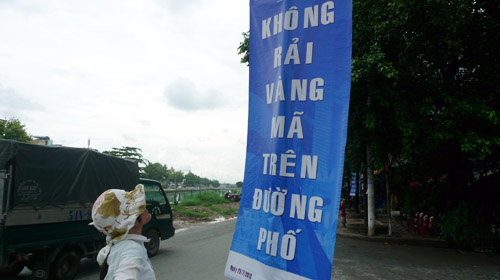The long-standing Vietnamese practice of scattering or burning votive paper offerings during funerals and worship activities is inadvisable and should gradually be stopped, most of the respondents in a small survey said.
>> An audio version is available here
The survey was carried out on 40 people, including 20 inhabitants in Ho Chi Minh City, 10 residents in Hanoi, and 10 sociologists, religious dignitaries and state officials.
Of the 40 respondents, 34, or 85 percent, said scattering or burning votive paper offerings – including money, houses, cars, and others made of paper and other material – is not advisable and should gradually be eliminated, as it is a superstitious act that causes waste and environmenal pollution.
The remaining six respondents, or 15 percent, believed this practice brings about no bad effects.
Twenty-three respondents said that they often burn votive paper offerings at funerals, on death anniversaries, the fifteenth day of the seventh month in the lunar calendar, and during other religious and worship activities.
About 52.2 percent of these people expressed their belief that their dead relatives would receive and use what they burned in the other world.
T.M.N., a woman of Ho Chi Minh City’s Go Vap District, said she often burns votive paper on the fifteen day of every lunar month to pray for safety, happiness and good luck for her family.
“I sometimes have a dream in which I see my deceased relatives receive what I have burned for them.”
Meanwhile, the remaining 47.8 percent said they are not sure whether the deceased would receive the votive paper offerings, but they still burn such items to seek peace in mind.
About 45 percent of the respondents thought religious dignitaries should advise followers to kick the habit of burning votive paper items, while 42.5 percent wanted local authorities to discourage residents from observing the practice.
Nguyen Thi Thanh Truc, a woman in District 12, Ho Chi Minh City, said, “Local administrations should keep the public informed of the harm of this practice. Putting an end to this practice is hard but we can make it if we are persistent and determined.”
Around 37.5 percent of the respondents suggested that a ban on scattering or burning votive paper offerings be enforced and any breach be strictly punished.
However, 30 percent of those polled said that this long-standing worship rite could not be scrapped completely.
“The burning of votive paper items for the deceased has been deeply rooted in the minds of Vietnamese people, so it cannot be abandoned overnight,” said Nguyen Thi Truong, one of the respondents.
Venerable Sir Thich Thien Tanh, deputy chairman of the Vietnam Buddhist Sangha’s Executive Council, said that the burning of votive paper offerings is Vietnamese people’s custom.
Buddhism does not encourage this practice but cannot prevent it either, as it belongs to the spiritual life of people, the monk said.
It is absurd to say that after houses, cars or other items made of paper are burnt to ashes, the deceased would receive them intact for use in the other world, the monk added.
Therefore, it is necessary to limit the practice, he said.
“If a person who intends to burn VND100,000 [US$4.45] worth of votive paper offerings, he or she had better limit the value of the items to just VND10,000 and use the remaining VND90,000 for charity,” the monk advised.
Like us on Facebook or follow us on Twitter to get the latest news about Vietnam!






















































